August 4th, 2009
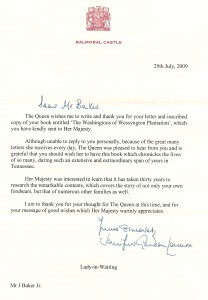
Letter from Queen Elizabeth
Queen Elizabeth acknowledged the receipt of a signed copy of my book. As is the custom, her lady-in-waiting wrote me. The royal seal indicated that the Queen was at her summer residence, Balmoral Castle in Scotland.
http://en.wikipedia.org/wiki/Balmoral_Castle– for your info.
Tags: African American History, Balmoral Castle, Buckingham Palace, Civil War, Genealogical Research, President Washington, Queen Elizabeth, Royal Family, Slavery, Tennessee history, Washington family
Posted in Civil War, Current Events, Genealogy & DNA, Interviews, Introduction & Personal, Plantation Life, Research | Comments Closed
July 24th, 2009
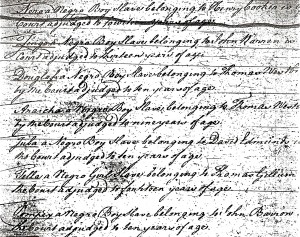
Court Orders, Southampton County, VA, 1749
Nero a Negro boy slave belonging to Henry Cooker is by the court adjudged to fourteen years of age.
Zingo a Negro boy slave belonging to John Warren by the court adjudged to thirteen years of age.
Douglas a Negro boy slave belonging to Thomas Westbrooks by the court adjudged to ten years of age.
Anarcha a Negro boy slave belonging to Thomas Westbrooks by the court adjudged to nine years of age.
Juba a Negro boy slave belonging to David Edmunds by the court adjudged to ten years of age.
Tilla a Negro girl belonging to Thomas Gillum the court adjudged to fourteen years of age.
Pompey a Negro boy slave belonging to John Barrow the court adjudged to ten years of age.
During the Colonial period, slave owners were required to pay taxes on their slaves from ages twelve to fifty years old. When Africans were brought to the colonies and it was evident that they were adults they were simply added to tax rolls called tithables. When small children and teenagers arrived from Africa and their ages were uncertain, the slave owners would have to take them into court and a judge would assign an age for the slave, which was then recorded in minute or court order books. Most of the slaves were assigned English names, although some retained their true African names. Some of the court orders also list the names of the ships the Africans arrived in and the dates of arrival. Many of these individuals can be traced in later documents such as tax records, wills, and estate settlements. These records can prove to be a genealogical goldmine for African American researchers.
Tags: Adjudgements, African American History, African History, African Names, African Roots, African Slavery, Colonial Period, Colonial Research, Colonial Tax Records, Court Orders, plantation slavery, Slave Research, Slave Ships, Slavery, Southern Plantions, Tithables, Transatlantic Slave Trade, United States History, United States slavery
Posted in Genealogy & DNA, Plantation Life, Research, Uncategorized | Comments Closed
July 24th, 2009
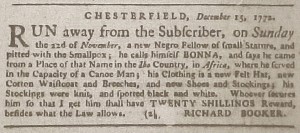
Virginia Gazette, Williamsburg, December 24, 1772
Chesterfield, December 15, 1772. Run away from the Subscriber, on Sunday the 22d of November, a new Negro Fellow of small Stature, and pitted with the Smallpox; he calls himself BONNA, and says he came from a Place of that Name in the Ibo Country, in Africa, where he served in the Capacity of a Canoe Man; his Clothing is a new Felt Hat, new Cotton Waistcoat and Breeches, and new Shoes and Stockings; his Stockings were knit, and spotted black and white. Whoever secures him so that I get him shall have TWENTY SHILLINGS reward, besides what the Law allows.
Richard Booker
A great source of tracing early African and African American ancestors is the Virginia Gazette. Slave owners ran ads describing in great detail their runaway slaves, apprentices and indentured servants. Many of these ads list native Africans, their ethnicities, country of origins, their owners, how long they had been in the colonies, and the ships they came on. These records are online at http://etext.virginia.edu/subjects/runaways/1740s.html.
Tags: African Slavery, American Revolution, Colonial Period, Colonial Records, Ibo Country, Plantation Rebels, plantation slavery, runaway slaves, Slave Ships, The Revolution, Transatlantic Slave Trade, Virginia Gazette
Posted in Genealogy & DNA, Plantation Life, Research | Comments Closed
July 16th, 2009
On Saturday August 8th the Terry family will tour Wessyngton Plantation as part of their bi-annual family reunion. The group will tour the Wessyngton slave cemetery, the Washington family cemetery, the grounds around the mansion and a restored slave cabin. Members of the National Black Arts Festival from Atlanta will also attend the reunion festivities. Following the tour the group will dine at the Tennessee National Guard Armory. I will also autograph copies of my new book The Washingtons of Wessyngton Plantation: Stories of My Family’s Journey to Freedom. The Terrys descend from Dick Terry 1818-1879 and Aggy Washington Terry born 1824. Today there are more than 1,000 Terry family members.
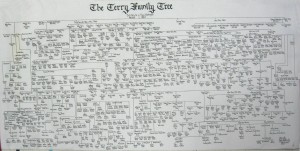
Terry Family Tree
Tags: Aggy Washington Terry, August 8th, Dick Terry, National Black Arts Festival, Slave Cabin, Slave Cemetery, Terry Family Reunion, Washington family
Posted in Book Tour & Reviews, Current Events, Genealogy & DNA, Interviews, Introduction & Personal, Plantation Life, Research, Uncategorized | Comments Closed
July 13th, 2009
Check out my article on BlackPast.org. It is an excellent resource for African American history and genealogy.
Tags: African American Resources, From Slavery to Freedom, Genealogy & DNA, George Washington, Mt. Vernon, Plantation Life, Slave cabins, Slave Community, Slave Housing, Slave Life, Slavery to Freedom, Southern Plantations, Tennessee Plantations, Washington family, Wessyngton Plantation
Posted in Book Tour & Reviews, Current Events, Genealogy & DNA, Interviews, Introduction & Personal, Plantation Life, Research | Comments Closed
July 12th, 2009
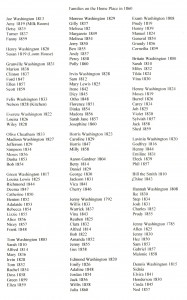
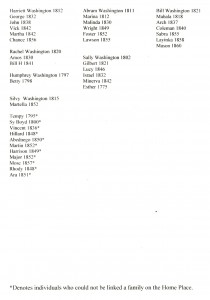
In 1860 Wessyngton Plantation was the largest tobacco plantation in the United States. The Washington family also held the largest number of enslaved African Americans (274) in the state of Tennessee. 187 of them were held on what was called the “Home Place” near the Wessyngton mansion. Eighty-seven others were held on a part of the plantation known was the “Dortch Place.”
Tags: African American Family Life in Slavery, Antebellum Plantation, Dortch Place, Emancipation, Emancipation Proclamation, Home Place, Slave Cabin, Slave Cemetery, Slave Family, Slave Housing, Slave Surnames, Slave Women, Tennessee Plantations, Tennessee slavery, Tobacco, tobacco plantation, Washington family
Posted in Civil War, Genealogy & DNA, Interviews, Introduction & Personal, Plantation Life, Research | Comments Closed
June 18th, 2009
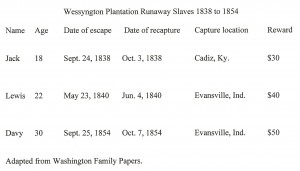
Wessyngton Runaways and Rebels
Enslaved African Americans used various forms of resistance against the institution of slavery. Some used passive forms of resistance such as pretending to be ill, secretly destroying tools, and work slow downs. Others used more drastic measures such as physical violence toward their enslavers and running away. Several men from Wessyngton Plantation escaped and made it to free territory. One slave Davy, ran away four times and was preparing to cross the Ohio River and go north to Canada when he was recaptured.
Tags: Big Dipper, Free Territory, North Star, Plantation Rebels, runaway slaves, Runaways and Rebels, slave rebellion, Slave Resistance
Posted in Civil War, Genealogy & DNA, Interviews, Introduction & Personal, Plantation Life, Research | Comments Closed
June 5th, 2009
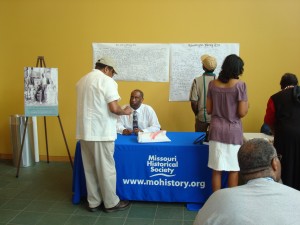
Book Signing at Missouri History Museum
My presentation at the Missouri History Museum was followed by a book signing, which was well attended. I enjoyed meeting the members of the St. Louis African American History and Genealogy Society who sponsored the event.
Tags: DNA Research, family history, family tree, Genealogical Research, Genealogy & DNA
Posted in Book Tour & Reviews, Genealogy & DNA, Interviews, Introduction & Personal, Plantation Life, Research | Comments Closed
June 5th, 2009
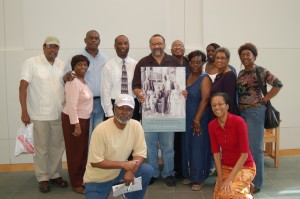
St. Louis African American History and Genealogy Society
On May 23rd I gave a presentation about my book The Washingtons of Wessyngton Plantation: Stories of My Family’s Journey to Freedom to the St. Louis African American History and Genealogy Society at the Missouri History Museum. I made many new friends among avid genealogical researchers. I had a great time in St. Louis and look forward to visiting again.
Tags: African American History, African American slavery, DNA Research, family history, family tree, Genealogical Research, Plantation Life, Washington family
Posted in Book Tour & Reviews, Current Events, Genealogy & DNA, Introduction & Personal, Plantation Life, Research | Comments Closed
June 3rd, 2009
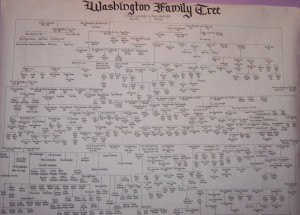
Washington Family Tree
One of the most exciting things about genealogical research is meeting new family members. In conducting research for more than thirty years I’ve found hundreds of relatives. I created this tree which spans ten generations and includes more than 600 names of descendants from my great-great-grandparents Emanuel and Henny Washington. I have genealogical information on all the families that came from Wessyngton including: Washington, Blow, Gardner, Terry, White, Williams, Lewis, Scott, Green and many others.
Tags: Family Crest, family history, Family Reunion, family tree, Genealogy & DNA
Posted in Current Events, Genealogy & DNA, Interviews, Introduction & Personal, Plantation Life, Research | Comments Closed









